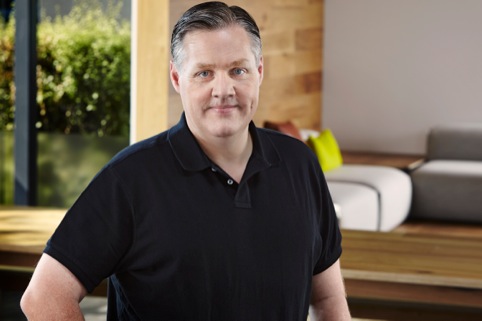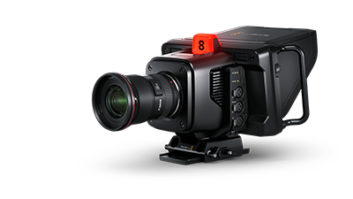
Blackmagic Design CEO Grant Petty gives a characteristically candid interview to Adrian Pennington about being in business to change companies and fix broken products
To understand what makes Blackmagic Design tick, it’s important to understand that its driving force, Grant Petty, was a post production engineer and to large extent stills sees himself as one.
“I could be kicking back in the Bahamas, but I just want to invent things,” he says. “When I was at facility houses my job was to help the creative guys making TV and commercials do the best possible job, to make the suites profitable and to make the whole thing work. Blackmagic is an extension of that.”
After spending his high school years assisting live theatre productions, he worked in his native Australia – then in Singapore – systems integrating, trouble shooting and shooting the breeze with colourists and fellow techies, working through the night fixing problems and becoming increasingly frustrated with tech suppliers.
“What really annoyed me was the quality of the equipment,” he recalls. “It was often not very good. Cintel machines, for example – which I can talk about now that we own it – had terrible quality of construction. Few suppliers were doing what we wanted, instead tying facilities up in long term contracts. It got to a point where I felt I just had to fix the broken supply side.”
This took the form of Petty’s first invention, a capture card for getting high quality video in and out of computers. Blackmagic Design expanded its portfolio of DeckLink, Intensity and Thunderbolt I/O devices before changing tack and acquiring loss-making Da Vinci Systems in 2009.
“It was amazing how critical the big Hollywood studios were of us at the time,” says Petty. “We said ‘You’ve got to trust us’, and we trebled the number of engineers on it. Da Vinci’s customers had been asked to sign up to support plans and were promised these amazing features which were not delivered. The company was in such a bad way.”
Acquisition trail
Blackmagic re-designed Resolve, launching a software-only version, number 10 of which can be downloaded by existing customers for free. After fixing Da Vinci, Blackmagic acquired Echolab, maker of the Atem vision mixers, video processing firm Teranex, and then the intellectual property of ailing UK TK developer Cintel, though Petty admits he has yet to find a use for the patents.
“We’ve got some pretty radical ideas for it but I also wonder why we are playing with this since the future for film itself is pretty uncertain.”
What was needed to be fixed about the digital cameras market, TVBE wonders? “I wanted more colourists in the world,” says Petty. “Most people involved in professional video had the picture and the sound but the emotional track, which a great colourist can deliver, was missing. I thought it a tragedy that only the biggest post houses could afford grading kit. We got Da Vinci out and then it hit us that some of the most creative people were using DLSRs but that these cameras had next to no dynamic range. The Alexa was awesome, but expensive, so the thinking was, why not introduce the emotional track for everyone?”
Petty says he made initial approaches with the idea to camera manufacturers, but was beaten back, “They wanted to do their own thing.”
In 2012 it unveiled a digital HD cinema camera with 13 f-stops for just £1500 and followed that up with the BM4K super35mm camera, just shipping, costing £2500 and a digital super16mm variant dubbed the Pocket Cinema Camera.
“The entire world will by Ultra HD at some point,” predicts Petty. “The increasing pixel density of screens make it logical. In Europe, Ultra HD is important because broadcasters have been hobbled by electing 1080i rather than 1080p HD, so the jump in resolution to 4K will be felt.
“However, the computer industry will send 4K to the home before broadcast does. Broadcasters have to figure out how to get UHD 60p down a conventional channel. UHD at low frame rates is doable but even so it will emerge pretty rough on transmission. The problem is that 4K is being driven by organisations pretending that low frame rate UHD is good enough. That’s a press-release, not a workflow.”
Expressing admiration for ARRI and Chyron, Petty has harsh words for most other manufacturers. “Most vendors are stupid, not smart. They don’t care about the product. Their only goal is to extract as much from the business as they can. It’s incredibly short termist, and greedy.”
Healthy work ethic
“I’m stunned at what is wrong with companies when we acquire them and we can examine them internally. There are so many pressures on businesses just to be bland, never to take a risk. We’ve never taken any outside investment at Blackmagic and we have no debt. As soon as companies do that they are beholden to a new master.”
Instead, Petty describes his 350-employee company as having a “healthy work ethic” and claims not to be interested in building market share.
“What’s healthy is working hard and feeling you did something rather than just sat in meetings all day,” he says. “We are not psychotic about make money at all costs and hardcore sales. We are unashamedly geeky. We want to be friendly and be of service. Call that nerdy if you like.”
Until recently, Petty was involved in every aspect of every single product, including writing all marketing copy. “My job is to bind it all together and set the culture,” he says. “I wish I could do more. I don’t have any grand vision and I’m surprised and delighted when it works.
“When we announce something that surprises the market at a trade show, it’s often because we ourselves have only made the decision to go for it a couple days earlier. You get really nervous when you do something creative because you can get it utterly wrong. Sometimes I’ll have an idea and I can’t sleep for weeks, wondering if it will work and if we can get it out the door before someone else does. I constantly feel we are not good enough, that there are so many things to fix, and not enough time. But I am overwhelmed and grateful that people like what we do.”
www.blackmagicdesign.com







